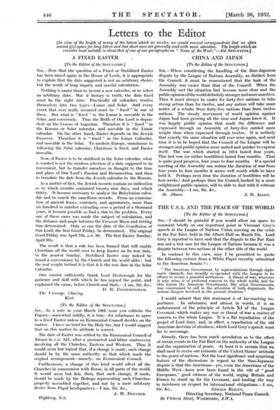THE U.S.A. AND THE PEACE OF THE WORLD
[To the Editor of the SPECTATOR.]
should be grateful if you would allow me space to comment briefly on one important point in Viscount Grey's speech at the League of Nations Union meeting on the crisis in the Far East, held in the Albert Hall on March 7th. Lord Grey is reported to have said that the dispute in the Far East was not a test case for the League of Nations because it was a dispute between two nations at the other side of the world.
In contrast to this view, may I be permitted to quote the following extract from a White Paper recently submitted to the American Senate ? :
" The American Government, by representations through diplo. matic channels, has steadily co-operated with the League in its efforts to secure a peaceful settlement. A threat of war, wherever it may arise, is of profound concern to the whole world, and for this reason the American Government, like other Governments, was constrained to call to the attention of both disputants, the serious dangers involved in the present situation."
I would submit that this statement is of far-reaching im- portance. In substance, and almost in words, it is an endorsement of the principle of Article XI of the League Covenant, which makes any war or threat of war a matter of concern to the whole League. It is a flat repudiation of the gospel of Lord Grey, and, in effect, a repudiation of the old American doctrine of aloofness, which Lord Grey's speech went far to encourage.
Already, there has been much speculation as to the effect of recent events in the Far East on the authority of the League and the organization of peace. At least it is certain that we shall need to revise our estimate of the United States' attitude to the peace of nations. Not the least significant and surprising feature of the discussions in regard to the Sino-Japanese dispute is that the Americans—yes, even the Americans of the Middle West—have now been found in the rile of " good Europeans," good citizens of the world, urging Britain and France to stand up for the Covenant, and leading the way in insistence on respect for international obligations.—I am,
Directing Secretary, National Peace Council. 89 Victoria Street, Westminster, S.W.1.


































 Previous page
Previous page